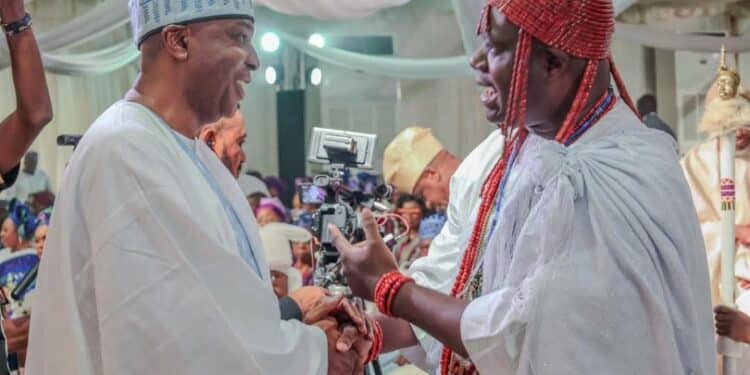I have read in many quarters and platforms the bitter condemnation of the act of the Ooni of Ife, His Imperial Majesty Oba Adeyeye Babatunde Enitan Ogunwusi OJAJA II, standing to greet the former Senate President, Dr Bukola Saraki, at a public function.
To some people, it was a “disgraceful act,” anathema to the expected conduct of a revered monarch.
This perspective often insists that a king should “rule, not merely reign,” deserving veneration, worship, and treatment akin to the “King of Kings.
However, to me, Ooni of Ife, His Imperial Majesty Oba Adeyeye Babatunde Enitan Ogunwusi OJAJA II, standing to greet Senator Bukola Saraki, while Saraki in turn crouched before an Emir, inadvertently sparks a crucial discourse on the evolving nature of traditional leadership.
My position is unequivocal: the Ooni’s conduct is not a lapse in regal dignity, but rather a profound testament to his cosmopolitan worldview, a deliberate repudiation of archaic feudalistic norms, and a reassertion of a distinct, democratic paradigm of kingship prevalent in the South-West of Nigeria.
The fundamental error in criticising the Ooni lies in conflating disparate socio-cultural ecosystems and applying a universal yardstick of “respect” that fails to account for historical evolution and regional specificities.
The very essence of aristocracy and feudalism, as understood globally, is rooted in systems of oppression, intimidation, and the blind, uncritical worship of a being merely born into privilege. This hierarchical structure, eloquently articulated by scholars like Marc Bloch in Feudal Society, inherently establishes a “Lord and Slave” relationship, where cultural testaments and societal rituals serve to reinforce extreme superiority on one hand and abject inferiority on the other. It is these very “self-God antics” and “nuances of the feudalist” that we, including the critics, vociferously condemn in contemporary discourse on human rights and equality. Yet, paradoxically, some appear to eulogise the very vestiges of this oppressive system when it comes to traditional institutions.
It is imperative to recognise that the socio-cultural niceties of a feudal aristocracy are profoundly different from those that define leadership in the South-West of Nigeria. The paradigm is not merely different; it is antithetical. In the South-West, our kings are not remote, intimidating overlords. On the contrary, they are our fathers, our leaders, not our oppressors or despotic “Lords of Manors.” Their authority, while deeply revered, is inherently democratic and consultative, rather than authoritative or dictatorial.
As anthropologists like J.D.Y. Peel (e.g., in his work on the Yoruba) have illustrated, Yoruba kings historically live among their people, engaging directly and without undue encumbrance in matters of governance and community well-being. This stands in stark contrast to systems where access to leadership requires navigating multiple intermediaries, reinforcing a rigid social distance.
Furthermore, the individual social tendencies, exposure, and environment of those who ascend to kingship are profoundly consequential. Kingship does not, and should not, preclude the exhibition of advanced culture, empathy, and dignified interaction. The Ooni of Ife, an internationally exposed and forward-thinking monarch, embodies a leadership style that acknowledges the inherent worth and dignity of every individual. His actions – consistently standing up to greet and shake hands with those who, in a feudal context, might be deemed “slaves” or “pawns” – are not an abdication of his regal status. Instead, they are a powerful, deliberate statement that “ko si Eru, Gbogbo wa lomo” (there are no slaves, we are all children).
This behaviour is a radical affirmation that everyone matters, that everyone counts, and that no one should be coerced or forced into humiliation and disrespect. It is a commendation of a king who, through his conduct, deeds, and acts, actively dismantles the psychological shackles of historical subjugation.
To commend the Ooni for recognising that those who are not kings deserve to be greeted with honour is to applaud a king who is not a slave driver but a genuine leader and motivator, approachable and committed to a new era of reciprocal respect. His actions are not a weakness, but a profound strength, signalling a vital shift in the cultural landscape of Nigerian leadership towards a more equitable and humanistic future.
This is my opinion.
May His Imperial Majesty, Olori Alade, The Arole Oodua, Ooni Ti Oni, Oba to so eru di Omo, Baba Tadenikawo, Oba Adeyeye Babatunde Enitan Ogunwusi (OJAJA II) Live Long.
*Barrister Ojo-Lanre sent this piece from Usi – Ekiti











